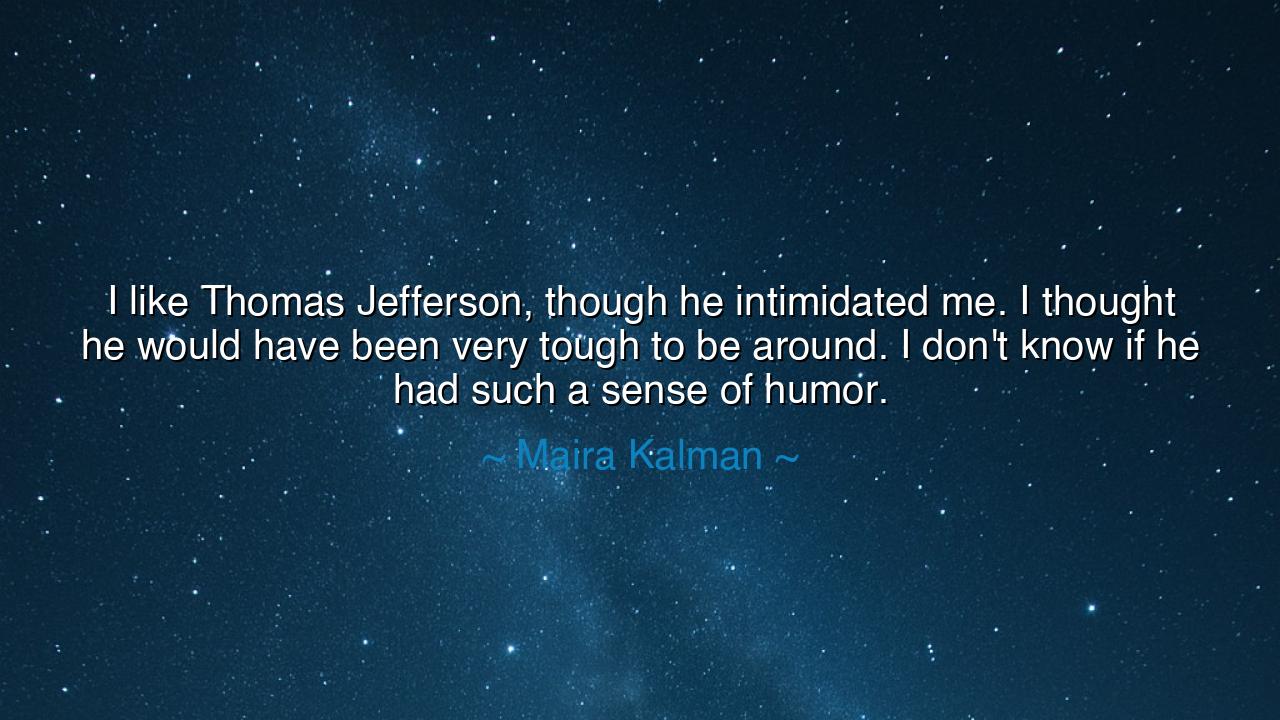
I like Thomas Jefferson, though he intimidated me. I thought he
I like Thomas Jefferson, though he intimidated me. I thought he would have been very tough to be around. I don't know if he had such a sense of humor.






In the vast sea of history, where countless figures have risen and shaped the world, there are certain individuals whose brilliance and gravitas stand out like towering mountains. One such figure is Thomas Jefferson, the third president of the United States and a founding father of the nation. His mind was a labyrinth of intellect, ambition, and serious purpose. Yet, as Maira Kalman reflects, "I like Thomas Jefferson, though he intimidated me. I thought he would have been very tough to be around. I don't know if he had such a sense of humor." These words echo not only the complexity of Jefferson’s character but also the deeper understanding that, while greatness often demands a certain seriousness, it is the humor—the ability to lighten life’s burdens—that truly reflects the full range of human depth.
In the ancient world, the most powerful minds were often seen as enigmatic figures. Consider Socrates, whose wisdom and sharp mind were matched by his humility and often biting irony. His philosophical pursuits were filled with moments of jest, challenging others to laugh at the absurdities of their own beliefs. Jefferson, like Socrates, was a man of great intellect, but unlike the playful Socrates, he often appeared more reserved, carrying the heavy mantle of statesmanship and nation-building. Kalman’s reflection on Jefferson’s intimidating nature highlights the distance that often exists between genius and the ordinary person. To be in the presence of such a towering intellect is to feel the weight of seriousness, and one might wonder if humor could even exist in such a formidable presence.
The tension between seriousness and humor has long been a theme in the stories of the ancients. Aristotle, in his writings on ethics, made clear that a balanced life was one that could engage in both intellectual pursuit and laughter. He saw humor as a vital force for social connection, a way to break down the barriers between individuals and society. In this sense, Jefferson, despite his towering intellect, may have lacked the more open and playful humor that we might associate with other historical figures. His seriousness, as Kalman observes, was both a reflection of his duty and a possible limitation in the full expression of his humanity. Jefferson’s private letters show glimpses of wit, yet he was often more focused on the great matters of statecraft and philosophy than on the lighter side of life.
Yet, there are other figures from history who exemplify the balance between humor and seriousness, showing that it is possible to be both profound and playful. Take, for example, Benjamin Franklin, another of Jefferson’s contemporaries. Franklin, too, was a polymath—an inventor, diplomat, and philosopher—but he was also known for his sharp wit and love of laughter. His writings are filled with humor, whether in the form of his famous Poor Richard’s Almanack or his playful remarks in diplomatic circles. Franklin understood that humor was not a distraction from important work, but a way to keep the human spirit alive amidst the rigors of public service and intellectual pursuit. Franklin's example stands as a reminder that greatness does not have to be rigid or dour. Humor is a tool that can lighten even the heaviest of responsibilities, a way to build connections in a world that can often feel too serious.
In Kalman’s words, we also hear a reflection of human vulnerability. She admits to feeling intimidated by Jefferson, a feeling not uncommon when standing in the shadow of those who have shaped history. But this vulnerability also offers us a deeper insight into the human condition. The greatest minds are often, at least in public, a reflection of discipline and rigor. Yet, even in the case of Jefferson, who was known for his intellectual pursuits and moral convictions, we might imagine that his lack of humor in his public persona was, in some ways, a shield against the weight of the challenges he faced. In his role as president, as a founder of a new republic, humor might have seemed out of place, irrelevant in the face of the great questions of freedom, equality, and justice.
But as Kalman suggests, humor’s absence in Jefferson’s public life does not diminish his greatness; it simply highlights the complexity of human character. Humor, in its lightness, allows us to reflect on the serious matters of the world with a spirit of connection and understanding. Without it, we risk becoming consumed by our own seriousness, losing sight of the shared humanity that binds us together. It is in moments of laughter that we find relief from the heavy burden of life’s challenges, and we remember that even the greatest minds, like Jefferson, are not immune to the human need for joy and levity.
The lesson from Kalman’s reflection is one that invites us to live fully, embracing both the weight of our responsibilities and the lightness of humor. Like Jefferson, we may find ourselves focused on the serious tasks of life—whether in work, relationships, or personal pursuits—but we must also make space for laughter. Humor is not a frivolous diversion, but a vital force that nurtures our souls and connects us to each other. In moments of intellectual rigor, let us remember that humor, in all its forms, is the great equalizer, a way to embrace the complexities of life with joy and grace. Just as Jefferson’s brilliance shaped the course of history, let us shape our lives with the wisdom of both seriousness and humor, ever mindful of the balance that makes us fully human.






AAdministratorAdministrator
Welcome, honored guests. Please leave a comment, we will respond soon